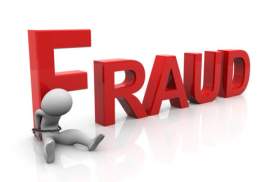
Fraud Defined

What is Fraud?
Fraud is an illegal action that in regards to a broad definition refers to a deliberate misrepresentation, which directly or indirectly causes another person to suffer damages, typically in the form of monetary losses.
The charge of fraud is typically attached to individuals who sell a product or service to the generic consumer base. If the underlying product is misrepresented or the selling party uses untruthful or devious means to sell the product, he or she will be committing fraud.
Legal Definition of Fraud:
The common interpretation of fraudulent behavior incorporates a delivery of untruthful information or misrepresenting oneself to take advantage of another party. In regards to the law; however, the act of lying only constitutes just a portion of fraud.
For instance, a salesman may lie about his place of birth, name, or family history, but as long as he remains consistent and truthful about the product he is selling, he will not be found guilty, in the court of law, of committing fraud.Through this scenario, an individual will commit fraud if there is a deliberate misrepresentation of a product or service, which precipitates a monetary damage for the purchasing party.
What does a Fraud case typically entail?
The majority of fraud cases involve complex financial transactions that are enshrouded in incongruences to effectively “trick” consumer or investors into thinking they are accessing a profitable asset. These forms of fraudulent transactions or deals are typically employed by ‘white collar criminals’ or business professionals who possess a specialized knowledge and direct criminal intent.
For example, an unscrupulous investment advisor or broker may present clients with a business opportunity to invest in a lightly-traded stock; the status of a professional advisor gives this individual credibility, which ultimately leads to a justified believability in regards to his clients. As a result of his ‘expertise’ and the opportunity presented those who believe the investment in alignment with the information delivered will invest substantial amounts of cash into the stock.
If the information delivered was inaccurate and misrepresented by the advisor (if the advisor lied about the fundamentals of the stock or its presence in the marketplace) the individual will be accused of fraud, regardless of the underlying asset’s price fluctuations.
Through this somewhat cloudy example it can be assumed that fraud is not easily proven in the court of law. Additionally, laws concerning a fraud conviction will vary from state to state, but in a typical sense, several conditions must be met. The most fundamental aspect to prove a fraud conviction is the presence of justifiable or actual reliance in regards to the accused individual.
How to prevent and Fraud and what to do if you are a victim of Fraud?
The most basic way to prevent fraud is to investigate all business deals that you partake in. The examination and investigation of all finances and intricacies associated with a deal will not only yield a better understanding of the deal, but will also come into play if the case is brought to the courts. When an individual investigates a deal and understands the intricacies associated with a proposition they will understand what to expect when the deal is made tangible.
If an investigation is not conducted and the case is brought to a court, the accused party can claim that the alleged victim had the opportunity to discover the potential fraud. That being said, once a party enters into a legally binding contract, remorse of the terms latent in the deal is not the same as fraud.
If you feel as though you entered into a fraudulent business deal, you must immediately consult a legal professional. Be sure to collect all evidence in regards to the business transaction and the monetary damages suffered and be sure to keep in mind that fraud is not easily proven in a court of law.



















